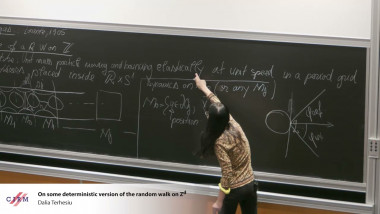
On some deterministic version of the random walk on $\mathbb{Z}^d$
By Dalia Terhesiu
Appears in collection : Analysis and simulations of metastable systems / Analyse et simulation de systèmes métastables
We prove the existence of an active phase for activated random walks on the lattice in all dimensions. This interacting particle system is made of two kinds of random walkers, or frogs: active and sleeping frogs. Active frogs perform simple random walks, wake up all sleeping frogs on their trajectory and fall asleep at constant rate $\lambda$. Sleeping frogs stay where they are up to activation, when waken up by an active frog. At a large enough density, which is increasing in $\lambda$ but always less than one, such frogs on the torus form a metastable system. We prove that $n$ active frogs in a cramped torus will typically need an exponentially long time to collectively fall asleep —exponentially long in $n$. This completes the proof of existence of a non-trivial phase transition for this model designed for the study of self-organized criticality. This is a joint work with Amine Asselah and Nicolas Forien.
